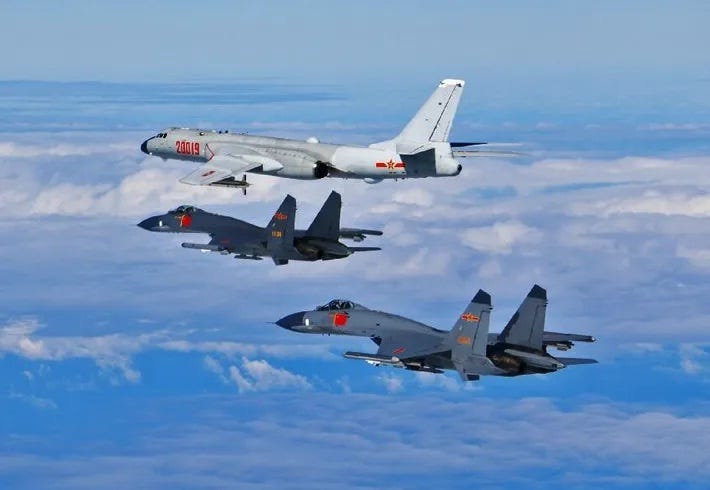Why are observers asking if China will invade Taiwan during Iran conflict?
I have heard this theory raised a few times in discussions the past three days, and think it is important to dig into this topic a bit. I do not normally focus on cross-straits ties, and there are a plethora of smarter people than I on that issue. But it does intersect other areas I study: Middle East and defense policy. So, from that framing, I try to answer the main question: will China use the Iran crisis to advance against Taiwan?
A number of observers have postulated that a shift in the U.S. military footprint toward the Middle East in response to escalations between Israel and Iran will open a strategic window for China to further threaten or invade Taiwan. The logic is rooted in the belief that the United States is unlikely to sustain a two-front war, especially one spanning the Middle East and the Indo-Pacific. The views may be further fueled by recent tensions between China and Taiwan over Taiwanese President Lai Ching-te’s comments that Taiwan “of course is a country.” This invasion assessment, while tempting in its relative simplicity, overlooks a fundamental constraint on China’s ability to wage a prolonged offensive: energy.
Yes, it’s true that a U.S. pivot toward conflict in Iran may create a temporary reduction in American military focus on the Indo-Pacific. But the idea that this gives China a green light to seize Taiwan underestimates how deeply tied Beijing’s warfighting capacity is to energy logistics—particularly from the Gulf.
Roughly 50% of China’s imported energy comes from the Gulf region, much of it transported through the Strait of Hormuz. In the current conflict, U.S. and Israeli forces have demonstrated overwhelming superiority in the air and maritime domains around Iran. Iran’s own parliament has voted to close the Strait of Hormuz in retaliation. While this has minimal direct effect on the United States—which receives less than 10 percent of its oil from Hormuz—the consequences for China and the European Union are far more severe.
In short, Beijing would be risking a major lifeline. Wars are fought and won through strong and sustainable supply chains, access to resources, and logistics over time. An invasion of Taiwan would likely trigger global responses—and in this climate, it would be dangerously easy for the West to sever China’s access to Gulf oil through Hormuz. This is the very vulnerability China has spent years trying to hedge against, deepening energy ties with energy-rich Gulf states and investing in overland routes and strategic reserves.
Could China look to Russia to backfill lost energy? Possibly—but not at the scale or speed required to sustain a high-intensity conflict across the Taiwan Strait. Moreover, doing so would deepen China’s dependence on Russia at a time when it is already cautious about being perceived as overaligned with a country mired in the Ukraine war.
The more relevant point here is that despite the narratives of imminent Chinese aggression, there seems little strategic incentive for Beijing to gamble now. Unlike the U.S. and Russia, China is the only major power not currently entangled in active combat. That doesn’t make it more powerful in military terms—but it does reinforce the image Beijing is crafting for the Global South: a responsible actor avoiding military adventurism while the West and Russia escalate regional wars.
Does that image translate into hard power? Not necessarily. But perception matters. Beijing likely sees far more value in positioning itself as a stable alternative to Washington and Moscow than in launching a high-risk, high-cost war over Taiwan in the middle of global chaos and energy insecurity.
So why continue pushing the Taiwan invasion narrative? Sure, it is going to remain a scenario of concern—especially for military planners and regional actors. But in this moment, when global energy flows are on edge, Iran is in open conflict, and the Strait of Hormuz itself is at risk, the odds of China launching a major war that could choke off its own energy supply strikes me as slim.



Taiwan is a flash point that has been blinking for decades. But it seems a no-win scenario for either side if war erupts there. The US would be wise to maintain vigilance and stepping up its assets in the region. China would be wiser to promote itself as a strong, wealthy but stable alternative.